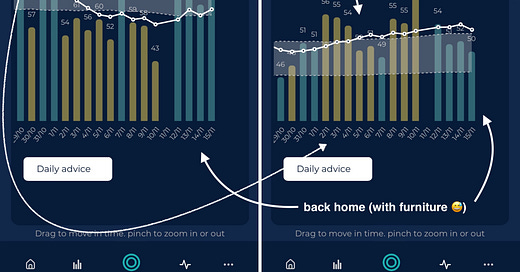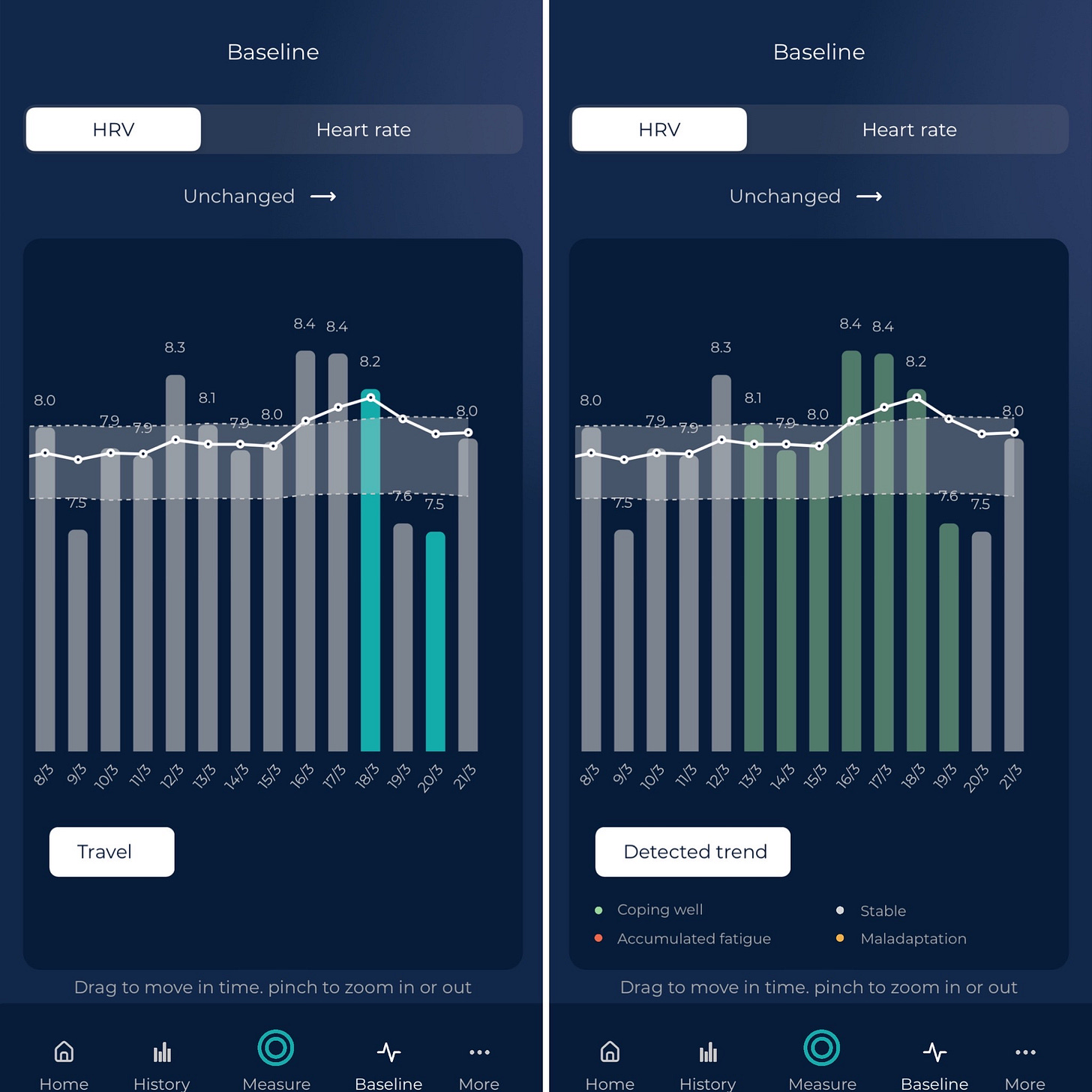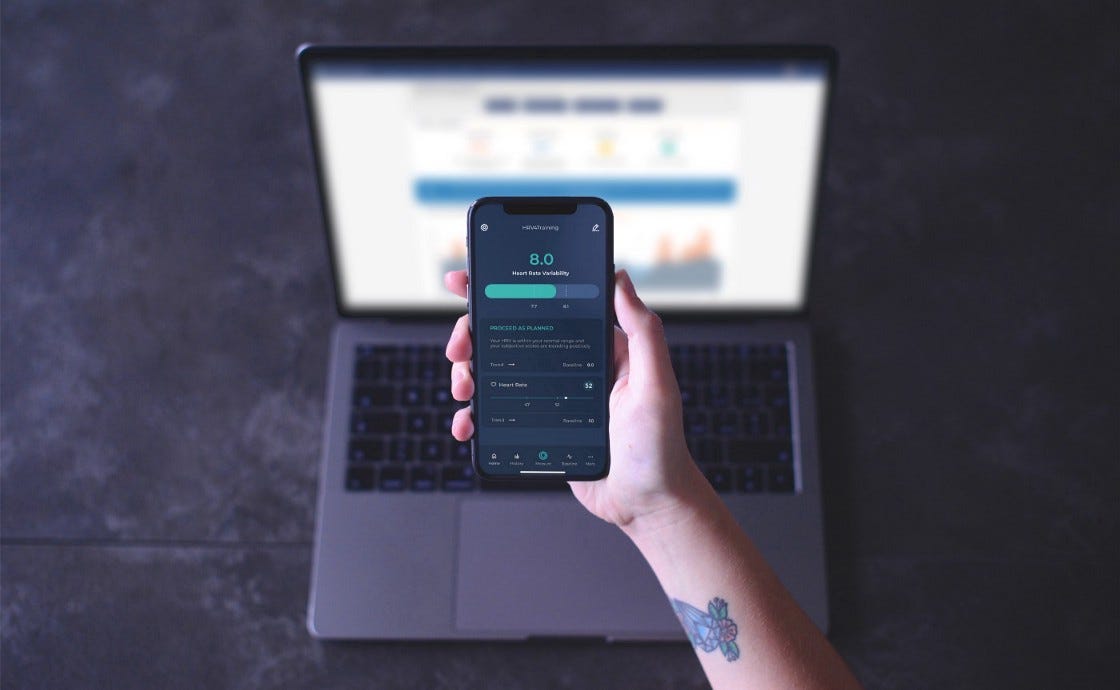hi there 👋
I hope everything is well.
A few weeks ago I shared the image below, showing quite clearly how different stressors impacted me during a few weeks that were quite packed in terms of work commitments:
This was of no surprise, of course, and was in line with what I felt during those days.
My point here is that since developing HRV4Training (10 years ago!) and working somewhat at the intersection of technology, health, and performance, my interest and understanding of these processes have shifted quite dramatically.
Training is hardly ever the (negative) stressor for most of us. Most importantly, training is not an isolated component but interacts with everything else that happens to us. While training is an important stressor, and as such, it can be key to monitor its impact on our body, what often causes a negative response, physiologically speaking, is non-training-related stress. This matters because our capacity to assimilate training-related stress is probably dependent on non-training-related stress. If I am in a hole because of work, because of health concerns, or other psychological stressors, I am not in a good place to train (and my body might not assimilate the stimulus positively even if I do get the training done, which is the whole point of HRV-guided training). The timing of the training stressor seems to matter too.
As Andrew Flatt once said (slightly paraphrasing here), a reduction in HRV is typically associated with one of the following:
a very large increase in the training stimulus or a novel training stimulus
non-training related stressors
The second point covers pretty much anything we experience in life, and is in my opinion the number one reason to monitor HRV: our capacity to handle stress is limited, and awareness of the factors that might have a larger impact on us, can help us make adjustments, either to the stressor itself, or if not possible, to other stressors that can be easily manipulated (i.e. training).
I see similar data reported by others all the time. Below is for example data that Matteo Tagliariol, former Olympic gold medalist, shared regarding his stress response and seasonal allergies:
While in the words of Max Stoneking, who has also been using HRV4Training for a while: “The best feature, for me, is its sensitivity for non-training stress. I encounter periods of this throughout the year with school workload“.
All stress counts.
So let me ask again: what’s stressing you out?
Once we figure that out, we can start implementing meaningful changes. It starts with awareness, and HRV can be a useful tool in the process, in my opinion.
Discount for Pro: 20% off
HRV4Training Pro is the ultimate platform to help you analyze and interpret your physiological data, for individuals and teams.
You can find a guide here.
Try HRV4Training Pro for free at HRVTraining.web.app or use promo code SCIENCE for 20% off.
In the app, Pro brings the normal values view, which can help contextualizing longer-term changes, as well as rMSSD on the homepage, see an example below:
See you next week!
Marco holds a PhD cum laude in applied machine learning, a M.Sc. cum laude in computer science engineering, and a M.Sc. cum laude in human movement sciences and high-performance coaching.
He has published more than 50 papers and patents at the intersection between physiology, health, technology, and human performance.
He is co-founder of HRV4Training, advisor at Oura, guest lecturer at VU Amsterdam, and editor for IEEE Pervasive Computing Magazine. He loves running.
Social:
Twitter: @altini_marco.
Personal Substack.










If I have been traditionally importing HRV from Oura app and now switched to using the phone camera immediately upon waking (with a new HRA trend that is now lower than what Oura showed), should I just let it all play out? The app, of course due to lower HRV scores, thinks I'm under stress but its just because of using the new method. What do you think?
Interesting papers coming out on emotional control and HRV in clinical risk groups - one showing ethnic differences. Fascinating stuff, but HRV seems to be having a moment.. I'll post them as I find them - mainly on researchgate. But I scan the research evrey morning and read papers on the weekend - got to if you want to stay current.
Also, have brilliant genomics buddy who keeps dumping his discoveries on me...